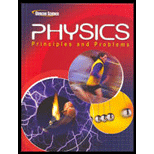
Concept explainers
(a)
To calculate:The mass defect
(a)
Answer to Problem 8PP
Mass defect of
Mass defect of
Explanation of Solution
Given:
For isotope
Mass
Atomic Number
For isotope
Atomic Mass Number
Atomic Number
Mass of hydrogen
Mass of neutron
Formula used:
Formula to calculate mass defect,
Where,
Calculation:
For isotope
As the number of protons in the nucleus of the atom is equal to the atomic number
Number of protons
Number of neutrons
Substitute the values in above formula,
Number of neutrons
Mass defect can be calculated by formula,
Substituting the values in above formula,
For isotope
To obtain the number of protons,
As the number of protons in the nucleus of the atom is equal to the atomic number
Number of protons
Number of neutrons
Substitute the values in above formula,
Number of neutrons
Mass defect can be calculated by formula,
Substituting the values in above formula,
Conclusion:
The mass defect of the isotope
(b)
To calculate:Binding energy of isotope
(b)
Answer to Problem 8PP
Binding energy of the isotope
Binding energy of the isotope
Explanation of Solution
Given:
Mass defect
Mass defect
Formula used:
Formula to calculate binding energy,
Where,
Calculation:
It is known that
For isotope
Substituting the values in above formula,
To convert binding energy in
For isotope
Binding energy in
Substituting the values in above formula,
To convert binding energy in
Conclusion:
The binding energy of the isotope
(c)
To Explain:The reason for binding energies are different.
(c)
Answer to Problem 8PP
Binding energies are different as they possess different mass defects.
Explanation of Solution
Introduction:
Mass defect can be calculated by formula,
Where,
Where,
Although the isotopes
Due to different atomic mass number, they differ in the mass defects.
Binding energy is dependent on mass defect hence as the mass defects are different of both the isotopes; the binding energies of the isotopes are different.
Conclusion:
Binding energies are different as they possess different mass defects.
Chapter 30 Solutions
Glencoe Physics: Principles and Problems, Student Edition
Additional Science Textbook Solutions
University Physics with Modern Physics (14th Edition)
College Physics (10th Edition)
University Physics Volume 2
Tutorials in Introductory Physics
College Physics: A Strategic Approach (3rd Edition)
Conceptual Physics (12th Edition)
 College PhysicsPhysicsISBN:9781305952300Author:Raymond A. Serway, Chris VuillePublisher:Cengage Learning
College PhysicsPhysicsISBN:9781305952300Author:Raymond A. Serway, Chris VuillePublisher:Cengage Learning University Physics (14th Edition)PhysicsISBN:9780133969290Author:Hugh D. Young, Roger A. FreedmanPublisher:PEARSON
University Physics (14th Edition)PhysicsISBN:9780133969290Author:Hugh D. Young, Roger A. FreedmanPublisher:PEARSON Introduction To Quantum MechanicsPhysicsISBN:9781107189638Author:Griffiths, David J., Schroeter, Darrell F.Publisher:Cambridge University Press
Introduction To Quantum MechanicsPhysicsISBN:9781107189638Author:Griffiths, David J., Schroeter, Darrell F.Publisher:Cambridge University Press Physics for Scientists and EngineersPhysicsISBN:9781337553278Author:Raymond A. Serway, John W. JewettPublisher:Cengage Learning
Physics for Scientists and EngineersPhysicsISBN:9781337553278Author:Raymond A. Serway, John W. JewettPublisher:Cengage Learning Lecture- Tutorials for Introductory AstronomyPhysicsISBN:9780321820464Author:Edward E. Prather, Tim P. Slater, Jeff P. Adams, Gina BrissendenPublisher:Addison-Wesley
Lecture- Tutorials for Introductory AstronomyPhysicsISBN:9780321820464Author:Edward E. Prather, Tim P. Slater, Jeff P. Adams, Gina BrissendenPublisher:Addison-Wesley College Physics: A Strategic Approach (4th Editio...PhysicsISBN:9780134609034Author:Randall D. Knight (Professor Emeritus), Brian Jones, Stuart FieldPublisher:PEARSON
College Physics: A Strategic Approach (4th Editio...PhysicsISBN:9780134609034Author:Randall D. Knight (Professor Emeritus), Brian Jones, Stuart FieldPublisher:PEARSON





